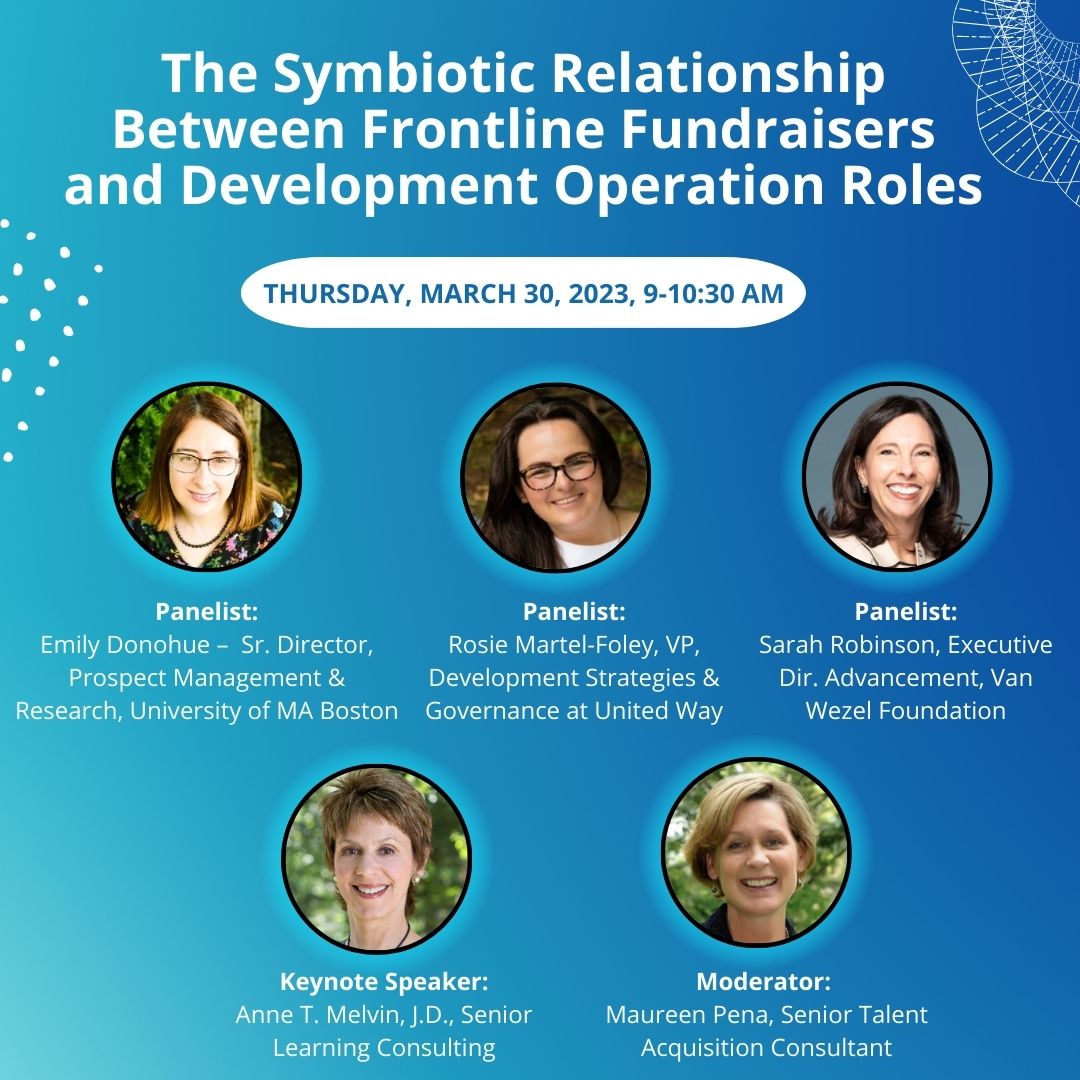Program Recap - Symbiotic Relationship Between Frontline Fundraisers and Development Operation Roles
 "The way to prepare for a successful future—whether you know what it is or not—is to keep acquiring skills, so you are ready when luck, opportunity, or clarity about your future strikes.” — Anne T. Melvin, JD, principal of Dynamic Fundraising Training On Thursday, March 30, an impressive group of development professionals gathered virtually to share their expertise during the Symbiotic Relationship Between Frontline Fundraisers and Development Operation Roles. The program kicked off with a keynote by Anne T. Melvin, JD, principal of Dynamic Fundraising Training, and was followed by a panel discussion moderated by senior talent acquisition consultant Maureen Pena. Panelists included fundraising and communications consultant Johane Alexis-Phanor of Beyond Wordz; Emily Donohue, senior director of prospect management and research at UMass Boston; Rosie Martel-Foley, vice president of development strategies and governance at United Way; and Sarah Robinson, executive director of advancement at the Van Wezel Foundation.
"The way to prepare for a successful future—whether you know what it is or not—is to keep acquiring skills, so you are ready when luck, opportunity, or clarity about your future strikes.” — Anne T. Melvin, JD, principal of Dynamic Fundraising Training On Thursday, March 30, an impressive group of development professionals gathered virtually to share their expertise during the Symbiotic Relationship Between Frontline Fundraisers and Development Operation Roles. The program kicked off with a keynote by Anne T. Melvin, JD, principal of Dynamic Fundraising Training, and was followed by a panel discussion moderated by senior talent acquisition consultant Maureen Pena. Panelists included fundraising and communications consultant Johane Alexis-Phanor of Beyond Wordz; Emily Donohue, senior director of prospect management and research at UMass Boston; Rosie Martel-Foley, vice president of development strategies and governance at United Way; and Sarah Robinson, executive director of advancement at the Van Wezel Foundation.
Five key takeaways from the event:
#1: At certain junctions in your career, it may be helpful to envision a “career jungle gym” rather than a “career ladder”—and sometimes, getting the career you’re most happy with means making a lateral move.
#2: Focus on honing your strengths rather than improving your weaknesses. Tap into your network—your manager, your colleagues, your friends—and your own intuition to determine the top five strengths you bring to a workplace. Knowing what you’re truly good at will make it easier to find your niche.
#3: Because frontline fundraisers work directly with donors, they tend to have more visibility—and get more accolades—than their back-of-the-shop colleagues. But development operation roles are equally important, and there are several ways to ensure productive, effective relationships between the two. For example, colleagues in prospect research, stewardship writing, and other support roles may notice trends or patterns not immediately apparent to those on the frontlines. Tap into their strengths and observations, and show appreciation—it goes a long way!
#4: f you’re just entering the development field, consider roles that are peripheral to frontline fundraising, or a frontline role itself—it’s a great way to see the work in action.
#5: Keep acquiring skills throughout your career—so when the next great opportunity presents itself, you’re ready for it!
Prepared by: Carmella Dion, WID Member

